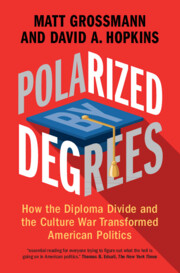Book contents
- Frontmatter
- Dedication
- Contents
- Inspiration and Acknowledgments
- 1 Introduction: Changing Parties in a Changing World
- 2 How Educated Liberals Are Winning the Culture War
- 3 “Hope and Change” Meets “Make America Great Again”
- 4 The Rise of the Diploma Divide in American Elections
- 5 Trust the Institutions, or Burn Them Down?
- 6 Fighting “Woke Capitalism”: The Republican Rebellion against Corporate America
- 7 Are Policymakers Solving Problems or Imposing Values?
- 8 Conclusion: Why Everything Is about Politics Now, and Politics Is about Everything
- List of Figures
- Notes
- Index
5 - Trust the Institutions, or Burn Them Down?
Published online by Cambridge University Press: 05 September 2024
- Frontmatter
- Dedication
- Contents
- Inspiration and Acknowledgments
- 1 Introduction: Changing Parties in a Changing World
- 2 How Educated Liberals Are Winning the Culture War
- 3 “Hope and Change” Meets “Make America Great Again”
- 4 The Rise of the Diploma Divide in American Elections
- 5 Trust the Institutions, or Burn Them Down?
- 6 Fighting “Woke Capitalism”: The Republican Rebellion against Corporate America
- 7 Are Policymakers Solving Problems or Imposing Values?
- 8 Conclusion: Why Everything Is about Politics Now, and Politics Is about Everything
- List of Figures
- Notes
- Index
Summary
Increasing educational standards in the workforce have increased the use of experts throughout the economy, leading to processes that more closely resemble bureaucracies and stakeholder policymaking, with an increasing emphasis on culturally liberal values such as diversity, representation, and social responsibility. The guiding industries and workforces of the scientific and technology sectors have enabled a technocratic ethos in government and industry. Public opposition to technocracy and skepticism of meritocracy is growing among voters, allowing conservatism to brand itself as an opposition movement to the extension of government reach and the associated prevalence of “politically correct” messages and practices across educational institutions and in the workplace. The polarized American brand of politics now pervades internal debates across organizational sectors, enlarging the scope of activist politics beyond campaigns and government, especially where educational and cultural divides are strongest. The distinct styles of the culture war’s two conflicting sides have become more dissimilar at the national, state, and local levels, even in ostensibly apolitical arenas.
Keywords
- Type
- Chapter
- Information
- Polarized by DegreesHow the Diploma Divide and the Culture War Transformed American Politics, pp. 162 - 203Publisher: Cambridge University PressPrint publication year: 2024

